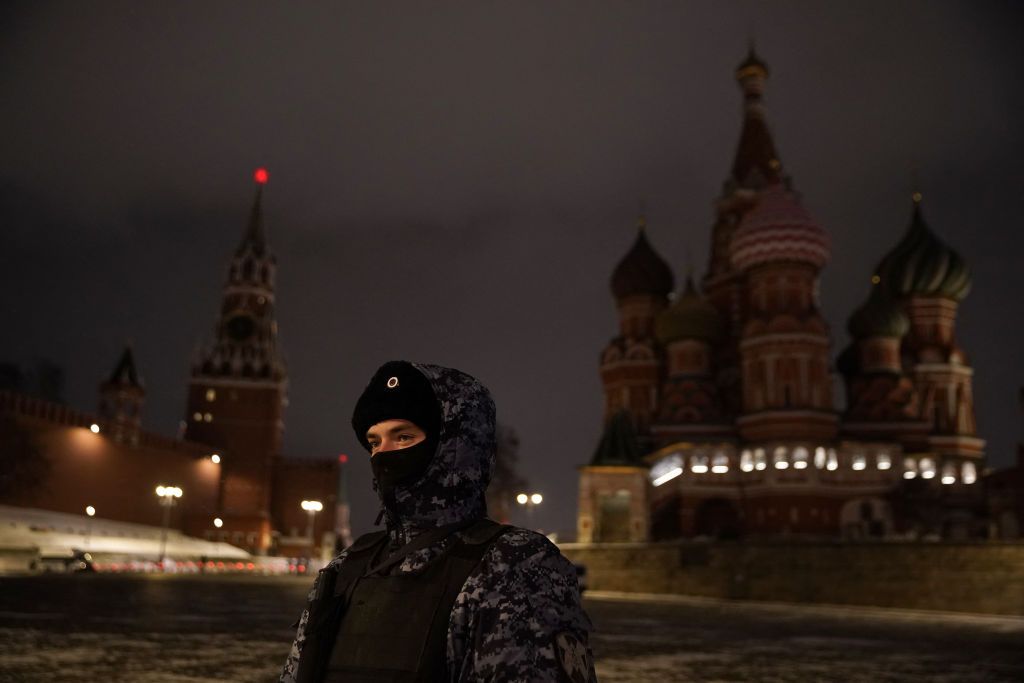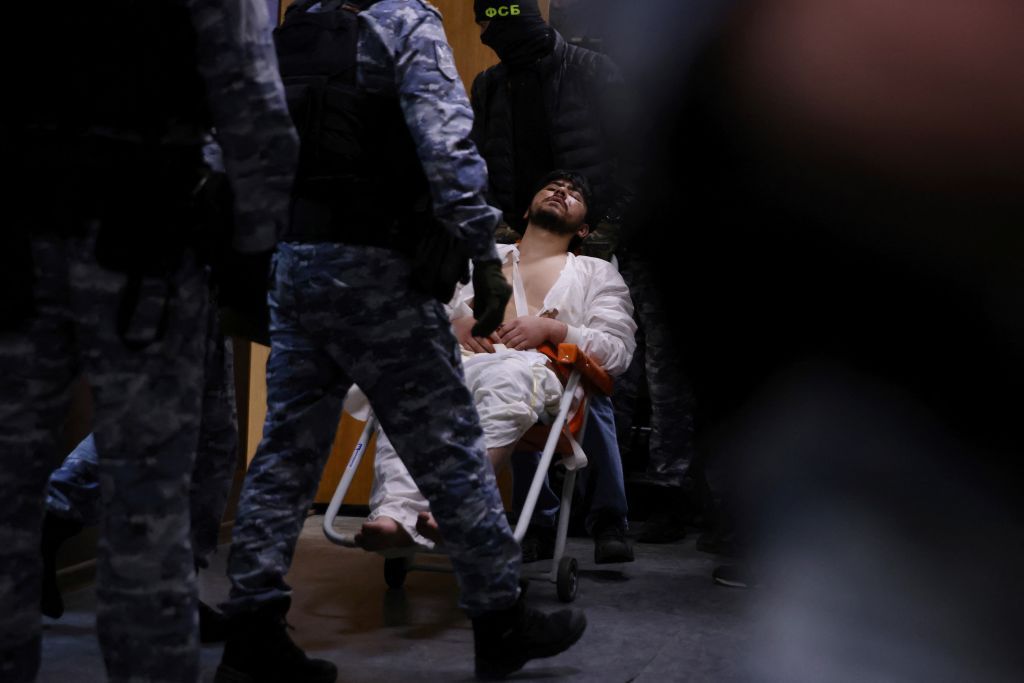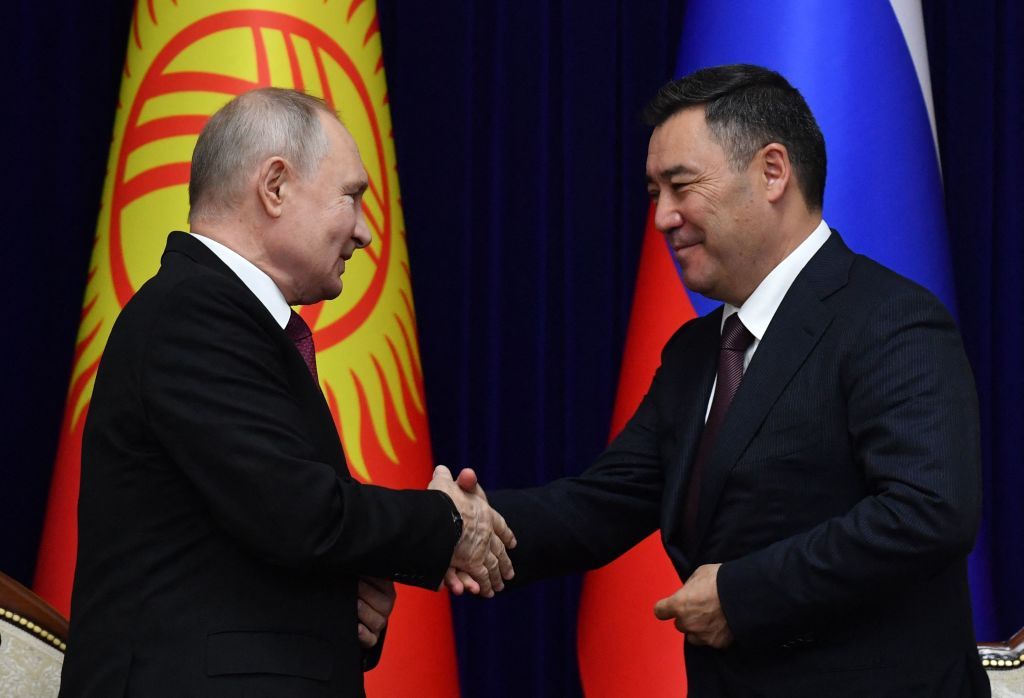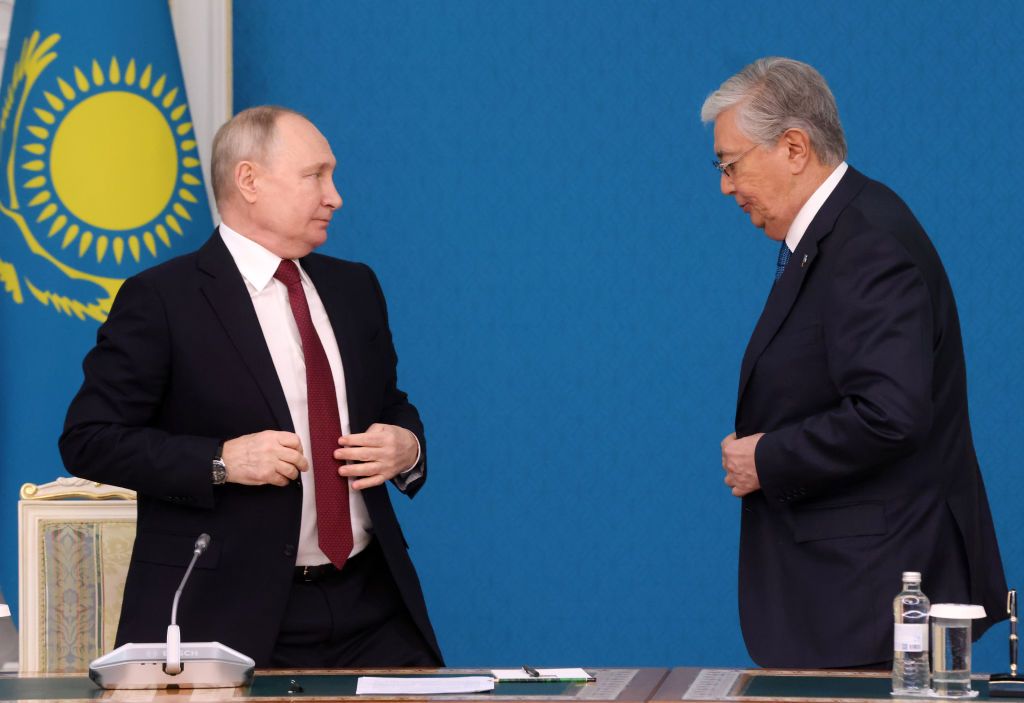Moscow shooting aftermath: Repressions, racism, terror

Russian President Vladimir Putin leaves the scene during his meeting with scientists at the State Kremlin Palace, on Feb. 8, 2024, in Moscow, Russia. (Photo by Contributor/Getty Images)
The March 22 Moscow mass shooting is likely to be used as a justification for a new wave of terror and oppression in Russia.
Russian politicians and propagandists began calling for reinstating the death penalty – a mechanism that can be used not only against terrorists but also against the peaceful opposition.
Furthermore, a new wave of xenophobia has spread across the country after it was revealed that the perpetrators of the attack were most likely citizens of Tajikistan, a Central Asian country bordering Afghanistan.
Millions of Central Asian migrants, primarily from Uzbekistan, Tajikistan and Kyrgyzstan, work in Russia in construction and retail. Cases of attacks and harassment from ordinary citizens and state authorities have been recorded en masse.
"The atmosphere of state terror is increasing in Russia," Sergei Sazonov, a Russian-born political philosopher at New York University, told the Kyiv Independent. "The (political atmosphere) is becoming more savage."
Russian officials have also used the attack for propaganda purposes, blaming Ukraine for the mass shooting despite there being zero hints that Kyiv was involved in any way.
Yet, despite the potential spike in repressions, xenophobia, and terror, Russia still looks unable to secure itself from potential further attacks.
Immediate impact
On March 22, a group of terrorists attacked the Crocus City Hall concert hall in Krasnogorsk, a Moscow suburb, shooting people and setting the venue on fire. At least 143 people were killed, making it the deadliest terrorist attack in Russia since 2004.
If the attack provides a justification for a crackdown on the opposition, it will not be the first time terrorism is used as a rationale for authoritarianism.
Russian President Vladimir Putin was elected following the 1999 Moscow apartment bombings. He used the war in Chechnya and alleged terrorist attacks by Chechen insurgents as an excuse for accumulating more power and building an increasingly authoritarian regime.

The 2004 Beslan school hostage crisis in North Ossetia, which resulted in at least 334 deaths, was used as a pretext for abolishing gubernatorial elections in Russia.
Although the Kremlin does not need any terrorist attacks as an excuse for a crackdown, the political atmosphere in the country is becoming even worse, Sazonov told the Kyiv Independent.
He said that one of the symptoms of this brutality is the way Russian security services publicly tortured suspected terrorists, cutting off a suspect's ear.
"Russian cops have always tortured people but have never proudly made it public like this," Sazonov said. "Law enforcement agencies will not face any punishment for stuff like this, including actions against the opposition."
Russian political analyst Georgy Satarov told the Kyiv Independent that a new crackdown on the opposition and civil society is possible after the terrorist attack.
He said that the Kremlin was tightening the screws due to its paranoid fear that something may get out of control.
Death penalty
The main symptom of the spike in terror is that Russian politicians and propagandists have called for reinstating capital punishment for terrorists following the attack. These include Leonid Slutsky, leader of the Kremlin-controlled LDPR nationalist party, and Sergei Mironov, leader of another Kremlin-controlled party, A Just Russia.
Vladimir Vasilyev, head of Putin's United Russia party's parliament faction, also said on March 23 that lawmakers would discuss the issue of reinstating the death penalty.
Russia imposed a moratorium on capital punishment in 1996 after joining the Council of Europe, which requires its members to abolish the death penalty.

However, discussions on reviving capital punishment were resumed after Russia was expelled from the Council of Europe due to its full-scale war against Ukraine in 2022.
Satarov said that it is de jure up to the Constitutional Court to reinstate the death penalty. However, if the Kremlin decides on the issue, the court will do its bidding, he added.
If the death penalty is revived, the terrorism article could be used to target anyone, according to Satarov.
Impact on Ukraine
There is also speculation that Russia may use the terrorist attack as a justification for escalating its aggression against Ukraine and launching a mobilization of conscripts for the war.
Putin was quick to blame Ukraine for the Crocus City Hall attack.
He claimed on March 23 that the terrorists had tried to flee to Ukraine, which had allegedly prepared a "window" for them.
Dmitry Medvedev, deputy chairman of Russia's Security Council and a former president, said on March 22 that "if terrorists of the Kyiv regime are behind this... all of them should be found and ruthlessly eliminated like terrorists... including state officials."
Sazonov argued, however, that Russia's policy on Ukraine is not determined by incidents like the Moscow mass shooting.
He believes that the Kremlin uses the attack for anti-Ukrainian propaganda purposes, but this will not affect its conduct of the war against Ukraine.
"They don't have the illusion that Ukraine is behind this, that's why they are so vague about it - without hints about consequences," Sazonov said.
Reasons for failure
The Kremlin's focus on its all-out war against Ukraine may explain Russian security services' failure to combat the Islamic State, which claimed to commit the attack and promised further actions against Russia.
Putin, who came to power during the Second Chechen War (1999-2000), has used the war on terrorism as a major justification for his rule and for giving security services immense powers.
But Russian security services suffered a major fiasco. Not the first time.
The U.S. warned Russia in early March about a potential terrorist attack by Islamic State-Khorasan (ISIS-K), the Afghani branch of the Islamic State terrorist group.
Despite the warning, the Russian authorities failed to prevent the attack.
Law enforcement agencies' handling of the attack itself has also been criticized.
Security services failed to prevent the terrorists from fleeing the concert hall and only arrested them hundreds of kilometers from Moscow.
Analysts say that the failure of Russian intelligence and law enforcement agencies is partially due to their focus on fighting Ukraine and the peaceful opposition in Russia rather than Islamists.
"All of their resources are in Ukraine," Sazonov said. "And it's also due to the general process of Russian intelligence agencies' degradation."
Not the first attack
Russia's failure to prepare for the Crocus City Hall shooting is also surprising, given that it is not the first ISIS attack on Russian targets.
In 2015, the Islamic State's Sinai branch claimed it was responsible for the Russian Metrojet Flight 9268 crash over Egypt's Sinai peninsula, which killed 224 people.
ISIS-K also claimed responsibility for a suicide bombing at the Russian Embassy in Kabul that killed at least eight people and injured at least 15 in 2022.
Meanwhile, Russia's Federal Security Service said on March 7 that it had foiled an attack by ISIS on a synagogue near Moscow.
Colin Clarke, a counter-terrorism analyst at the New York-based consulting firm Soufan Group, told the New York Times that ISIS-K "had been fixated on Russia for the past two years." The group accuses the Kremlin of killing Muslims in Afghanistan, Chechnya, and Syria, he added.
Reuters reported on March 26 that Sanaullah Ghafari, the leader of ISIS-K, "had overseen its transformation into one of the most fearsome branches of the global Islamist network, capable of operations far from its bases in the borderlands of Afghanistan."
According to the U.S.-based Critical Threats security project, ISIS-K has seen a resurgence following the withdrawal of U.S. troops and the Taliban's takeover of Afghanistan in 2021.

A July 2023 report by the U.N. Security Council said that ISIS-K numbered 4,000 to 6,000 people on the ground in Afghanistan.
The Islamic State had reasons to be unhappy with Russia since the Taliban, ISIS-K's main enemy in Afghanistan, has developed closer ties with the Kremlin. Another enemy of ISIS-K, Iran, is also allied with Russia.
Frank McKenzie, the former head of US Central Command, said that the Moscow attack was also in line with ISIS-K's long-term objective of increasing its foreign operations, Reuters reported.
Endangered region
Islamic State-Khorasan issued several statements promising further attacks on Russia. The terrorist group's increased activity may also lead to further destabilization of the region sandwiched between Russia and Afghanistan – Central Asia.
ISIS-K, a group operating in Afghanistan, has a substantial base among Afghani Tajiks and Uzbeks. The Islamic State-Khorasan has also increasingly recruited ethnic Tajiks and Uzbeks across the border in Tajikistan and Uzbekistan, according to Reuters.
A January UN report on ISIS-K said it had stepped up its efforts to enlist disillusioned members of the Taliban, with a special focus on ethnic Tajiks.
ISIS-K's activities in Central Asia may become a major threat for Russia.
Russia claims it is protecting the region from Islamism and has military facilities in Tajikistan, Kyrgyzstan, and Kazakhstan, and often treats Central Asia as its own backyard.

Tajiks and Uzbeks form a majority among labor migrants in Russia. They are among Russia's poorest residents and are often mistreated by their employers, the authorities, and the local civilian population.
The Russian authorities have already launched a crackdown on immigrants following the attack, and xenophobia will likely increase in Russia, Satarov said.
Serhiy Danylov, an expert at Ukraine's Association of Middle East Studies, told the Kyiv Independent that ISIS exploits poverty and religious fervor among Tajiks, which makes it easier to recruit them.
He added, however, that he sees no sign of an Islamist resurgence in Central Asia and that regional dictatorships keep Islamism under tight control.













